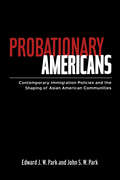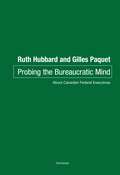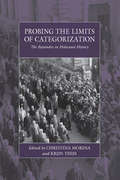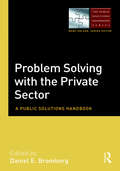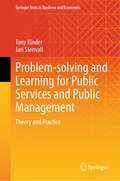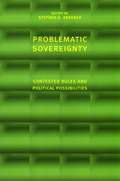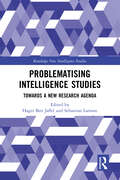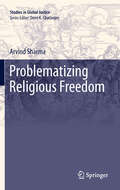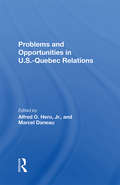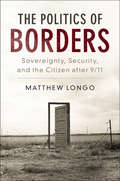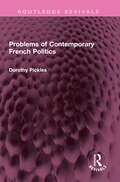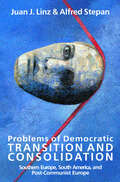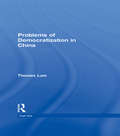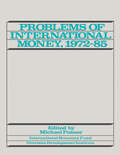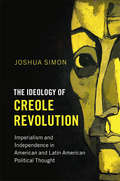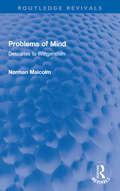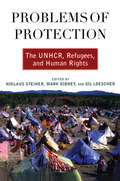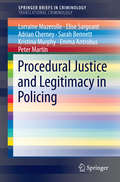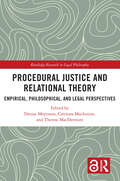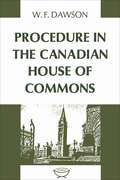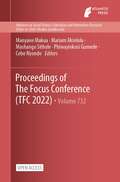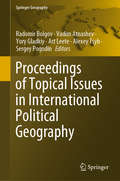- Table View
- List View
Probationary Americans: Contemporary Immigration Policies and the Shaping of Asian American Communities
by John Sw Park Edward Jw ParkProbationary Americans examines contemporary immigration rules and how they affect the make-up of immigrant communities. The authors' key argument is that immigration policies place race and class as important criteria for gaining entry to the United States, and in doing so, alter the makeup of America's immigrant communities.
Probing the Bureaucratic Mind: About Canadian Federal Executives
by Gilles Paquet Ruth HubbardThis book explores the thinking of Canadian federal public service senior executives through conversations. The transformation of the environment and of the institutional order has created quite a challenge: maintaining some sort of adequacy between these evolving realities and the frames of reference in use by public sector executives. Complexity is often nothing more than a name for a new order calling for a new frame of reference, and the reluctance to abandon old conceptual frameworks is often responsible for fundamental learning disabilities. Through a series of conversations with Canadian federal senior executives about more and more daunting problems - from coping with an evolving context, to engaging intelligently with a new modus operandi, to trying to nudge and tweak programs in order to correct toxic pathologies, to reframing perceptions and redesigning organizations to meet the new challenges—weaknesses of the capabilities of the Canadian federal executives to respond to current challenges were revealed, and suggestions made about ways to kick start a process of refurbishment of these capabilities.
Probing the Limits of Categorization: The Bystander in Holocaust History (War and Genocide #27)
by Christina Morina Krijn ThijsOf the three categories that Raul Hilberg developed in his analysis of the Holocaust—perpetrators, victims, and bystanders—it is the last that is the broadest and most difficult to pinpoint. Described by Hilberg as those who were “once a part of this history,” bystanders present unique challenges for those seeking to understand the decisions, attitudes, and self-understanding of historical actors who were neither obviously the instigators nor the targets of Nazi crimes. Combining historiographical, conceptual, and empirical perspectives on the bystander, the case studies in this book provide powerful insights into the complex social processes that accompany state-sponsored genocidal violence.
Problem Solving with the Private Sector: A Public Solutions Handbook (The Public Solutions Handbook Series)
by Daniel E. BrombergProblem Solving with the Private Sector presents advice and solutions for fruitful government–business alliances from the perspective of everyday public management. With a focus on job training, economic development, regulation, and finance and innovation, each chapter discusses a traditional tool of government presented in a practical and applied manner, as well as the implementation of the tool with clear examples. Content-rich case studies on a wide range of policy issues, including regulatory policy, natural resources, manufacturing, financial services, and health care highlight opportunities for government and business to collaborate to pursue the public good. This book offers current and future public managers possible solutions to complex problems for effective government–business alliances in a range of settings. It is essential reading for all those studying public management, public administration, and public policy.
Problem-solving and Learning for Public Services and Public Management: Theory and Practice (Springer Texts in Business and Economics)
by Jari Stenvall Tony KinderIn this textbook readers will acquire knowledge of problem-solving and learning to enhance both efficiency and the experience of service users in rapidly changing service environments, that can create new service models. Emphasizing that, above all else, individuals are at the centre of services, the book goes deeply into the nature of public services and their logic-of-practice. By applying learning and problem-solving approaches, the reader gains practical capabilities in addition to an appreciation of the latest research literature. Following a multidisciplinary, international approach, the book suggests a new typology of problem-framing and presents many examples of how new service solutions can be created in any public service context. The book offers a conceptual toolkit to understand and analyse dynamically changing services and the application of new technologies. Topics covered include pressing issues surrounding public services, such as e-technology, digitalisation, e-services, artificial intelligence, entrepreneurialism, sustainability, climate, inequality, developing economies, and smart cities. Chapters follow a similar structure: issue, problems, what we know, learning framework, worked example, theory and practice conclusions, as well as teacher and learner notes. Addressing advanced undergraduate and graduate students of public administration, public management, political science, sociology, computer science, and information systems, the book will also be a valuable resource for practitioners, i.e. experts and managers in public organizations, professionals in organizations working at the business and public sectors, consultants, and IT suppliers.
Problematic Sovereignty: Contested Rules and Political Possibilities
by Stephen KrasnerSome of the most pressing issues in the contemporary international order revolve around a frequently invoked but highly contested concept: sovereignty. To what extent does the concept of sovereignty—as it plays out in institutional arrangements, rules, and principles—inhibit the solution of these issues? Can the rules of sovereignty be bent? Can they be ignored? Do they represent an insurmountable barrier to stable solutions or can alternative arrangements be created? Problematic Sovereignty attempts to answer these and other fundamental questions by taking account of the multiple, sometimes contradictory, components of the concept of sovereignty in cases ranging from the struggle for sovereignty between China and Taiwan to the compromised sovereignty of Bosnia under the Dayton Accord. Countering the common view of sovereignty that treats it as one coherent set of principles, the chapters of Problematic Sovereignty illustrate cases where the disaggregation of sovereignty has enabled political actors to create entities that are semiautonomous, semi-independent, and/or semilegal in order to solve specific problems stemming from competing claims to authority.
Problematising Intelligence Studies: Towards A New Research Agenda (Routledge New Intelligence Studies)
by Hager Ben JaffelThis book offers a new research agenda for intelligence studies in contemporary times. In contrast to Intelligence Studies (IS), whose aim has largely been to improve the performance of national security services and assist in policy making, this book takes the investigation of the new professionals and everyday practices of intelligence as the immediate point of departure. Starting from the observation that intelligence today is increasingly about counter-terrorism, crime control, surveillance, and other security-related issues, this book adopts a transdisciplinary approach for studying the shifting logics of intelligence, how it has come to involve an expanding number of empirical sites, such as the police, local community, prison and the Internet, as well as a corresponding multiplicity of new actors in these domains. Shifting the focus away from traditional spies and Anglo-American intelligence services, this book addresses the transformations of contemporary intelligence through empirically detailed and theoretically innovative analyses, making a key contribution to existing scholarship. This book will be of much interest to students of intelligence studies, critical security studies, foreign policy, and International Relations.
Problematizing Religious Freedom
by Arvind SharmaThe concept of religious freedom is the favoured modern human rights concept, with which the modern world hopes to tackle the phenomenon of religious pluralism, as our modern existence in an electronically shrinking globe comes to be increasingly characterised by this phenomenon. To begin with, the concept of religious freedom, as embodied in Article 18 of the Universal Declaration of Human Rights, seems self-evident in nature. It is the claim of this book, however, that although emblematic on the one hand, the concept is also problematic on the other, and the implications of the concept of religious freedom are far from self-evident, despite the ready acceptance the term receives as embodying a worthwhile goal. This book therefore problematizes the concept along legal, constitutional, ethical and theological lines, and especially from the perspective of religious studies, so that religious freedom in the world could be enlarged in a way which promotes human flourishing.
Problems And Opportunities In U.S. – Quebec Relations
by Marcel DaneauThe failure of the May 1980 Quebec referendum on sovereignty and the ratification in 1982 of a Canadian constitution, over Quebec's vehement objection but with the acquiescence of all other provinces, would appear to indicate that the likelihood of Quebec's independence has been sharply reduced, if not eliminated. Not so, is the considered judgment
Problems Of International Politics: Sovereignty, Security, and the Citizen after 9/11 (Problems of International Politics)
by Matthew LongoBorders sit at the center of global politics. Yet they are too often understood as thin lines, as they appear on maps, rather than as political institutions in their own right. This book takes a detailed look at the evolution of border security in the United States after 9/11. Far from the walls and fences that dominate the news, it reveals borders to be thick, multi-faceted and binational institutions that have evolved greatly in recent decades. The book contributes to debates within political science on sovereignty, citizenship, cosmopolitanism, human rights and global justice. In particular, the new politics of borders reveal a sovereignty that is not waning, but changing, expanding beyond the state carapace and engaging certain logics of empire.
Problems of Contemporary French Politics (Routledge Revivals)
by Dorothy PicklesFirst published in 1982 Problems of Contemporary French Politics looks at the most important political controversies that have preoccupied France from the death of de Gaulle up to and including 1981 presidential and legislative elections. Three areas are discussed: the evolution of government and opposition parties, focusing in particular on their electoral attitudes and on the relations between parties making up the respective coalitions; the changes in the European and world situation and their effects on French political thinking in the field of foreign policy; and the political situation in which the fourth President of the Fifth Republic – and the first socialist President – takes up his office. Dorothy Pickles looks dispassionately at what promise to be the main issues dominating French politics in the 1980s, asking questions rather than suggesting answers. This book is a must read for students and scholars of French politics, French history, European politics, and international relations.
Problems of Democratic Transition and Consolidation: Southern Europe, South America, and Post-Communist Europe
by Alfred Stepan Juan J. LinzSince their classic volume The Breakdown of Democratic Regimes was published in 1978, Juan J. Linz and Alfred Stepan have increasingly focused on the questions of how, in the modern world, nondemocratic regimes can be eroded and democratic regimes crafted. In Problems of Democratic Transition and Consolidation, they break new ground in numerous areas. They reconceptualize the major types of modern nondemocratic regimes and point out for each type the available paths to democratic transition and the tasks of democratic consolidation. They argue that, although "nation-state" and "democracy" often have conflicting logics, multiple and complementary political identities are feasible under a common roof of state-guaranteed rights. They also illustrate how, without an effective state, there can be neither effective citizenship nor successful privatization. Further, they provide criteria and evidence for politicians and scholars alike to distinguish between democratic consolidation and pseudo-democratization, and they present conceptually driven survey data for the fourteen countries studied.Problems of Democratic Transition and Consolidation contains the first systematic comparative analysis of the process of democratic consolidation in southern Europe and the southern cone of South America, and it is the first book to ground post-Communist Europe within the literature of comparative politics and democratic theory.
Problems of Democratization in China (East Asia)
by Thomas G. LumFirst published in 2000. Routledge is an imprint of Taylor & Francis, an informa company.
Problems of International Money, 1972-85
by Michael PosnerA report from the International Monetary Fund.
Problems of International Politics: Imperialism and Independence in American and Latin American Political Thought (Problems of International Politics)
by Joshua SimonThe American and Latin American independence movements emerged from distinctive settings and produced divergent results, but they were animated by similar ideas. Patriotic political theorists throughout the Americas offered analogous critiques of imperial rule, designed comparable constitutions, and expressed common ambitions for their new nations' future relations with one another and the rest of the world. This book adopts a hemispheric perspective on the revolutions that liberated the United States and Spanish America, offering a new interpretation of their most important political ideas. Simon argues that the many points of agreement among various revolutionary political theorists across the Americas can be attributed to the problems they encountered in common as Creoles - that is, as the descendants of European settlers born in the Americas. He illustrates this by comparing the political thought of three Creole revolutionaries: Alexander Hamilton of the United States, Sim#65533;n Bol#65533;var of Venezuela, and Lucas Alam#65533;n of Mexico.
Problems of International Politics: The Wartime Origins of Democratization
by Reyko HuangWhy do some countries emerge from civil war more democratic than when they entered into it, while others remain staunchly autocratic? Observers widely depict internal conflict as a pathway to autocracy or state failure, but in fact there is variation in post-civil war regimes. Conventional accounts focus on war outcomes and international peacebuilding, but Huang suggests that postwar regimes have wartime origins, notably in how rebel groups interact with ordinary people as part of war-making. War can have mobilizing effects when rebels engage extensively with civilian populations, catalyzing a bottom-up force for change toward greater political rights. Politics after civil war does not emerge from a blank slate, but reflects the war's institutional and social legacies. The Wartime Origins of Democratization explores these ideas through an original dataset of rebel governance and rigorous comparative case analysis. The findings have far-reaching implications for understanding wartime political orders, statebuilding, and international peacebuilding.
Problems of Life
by Leon Trotsky Lev D. Trotsky Z. VengerovaFrom the introduction: Trotsky's great merit is the exceptionally wide scope of his vision. He unites the destructive elements of a revolutionary mind with the zeal of a master-builder intent on constructive work. The world knows him as one of the implacable Bolshevist leaders, but Problems of Life, a book published only a few months ago in Russian, shows Trotsky in a very different light. It shows that in the middle of his military and militant activities he devotes much of his energy to the peaceful work of social reconstruction, and that the centre of the problem lies for him in culture, education and morals. His book deals with the interests, duties and morals of daily life, and shows Bolshevism and the Bolshevist spirit from a new constructive side.
Problems of Mind: Descartes to Wittgenstein (Routledge Revivals)
by Norman MalcolmFirst published in 1972, Problems of Mind begins with a consideration of the view that the human mind is an immaterial thing that does not require corporeal embodiment for its operations. It takes up the conception that "inner experiences" are "strictly identical" with brain processes. The book also deals exclusively with the doctrine called "Logical Behaviourism", which will always possess a compelling attraction for anyone who is perplexed by the psychological concepts, who has become aware of the worthlessness of an appeal to introspection as an account of how we learn those concepts, and who has no inclination to identify mind with brain. The three most plausible theories of mind-body dualism, mind-brain monism, and behaviourism are all rejected, and nothing is set forth as the true theory. Norman Malcolm states that this is 'only a drop in the bucket. It will serve its purpose if it leads the reader into the writings of Wittgenstein, who is easily the most important figure in the philosophy of mind.’ Problems of Mind will be an essential read for scholars and researchers of philosophy of mind, ethics, logic, and philosophy in general.
Problems of Protection: The UNHCR, Refugees, and Human Rights
by Mark Gibney Niklaus Steiner Gil LoescherFirst Published in 2003. Routledge is an imprint of Taylor & Francis, an informa company.
Problems of Resettlement on Saipan, Tinian and Rota, Mariana Islands (Occasional Historical Papers Series No. #7)
by Neal M. BowersInvestigation into the problems associated with re-establishing a sustainable economy in the war-ravaged Northern Mariana Islands.
Procedural Justice and Legitimacy in Policing
by Peter Martin Adrian Cherney Sarah Bennett Lorraine Mazerolle Elise Sargeant Kristina Murphy Emma AntrobusThis brief focuses on the "doing" of procedural justice: what the police can do to implement the principles of procedural justice, and how their actions can improve citizen perceptions of police legitimacy. Drawing on research from Australia (Mazerolle et al), the UK (Stanko, Bradford, Jackson etc al), the US (Tyler, Reisig, Weisburd), Israel (Jonathon-Zamir et al), Trinidad & Tobago (Kochel et al) and Ghana (Tankebe), the authors examine the practical ways that the police can approach engagement with citizens across a range of different types of interventions to embrace the principles of procedural justice, including: · problem-oriented policing · patrol · restorative justice · reassurance policing · and community policing. Through these examples, the authors also examine some of the barriers for implementing procedurally just ways of interacting with citizens, and offer practical suggestions for reform. This work will be of interest for researchers in criminology and criminal justice focused on policing as well as policymakers.
Procedural Justice and Relational Theory: Empirical, Philosophical, and Legal Perspectives (Routledge Research in Legal Philosophy)
by Denise Meyerson, Catriona Mackenzie, and Therese MacDermottThis book bridges a scholarly divide between empirical and normative theorizing about procedural justice in the context of relations of power between citizens and the state. Empirical research establishes that people’s understanding of procedural justice is shaped by relational factors. A central premise of this volume is that this research is significant but needs to be complemented by normative theorizing that draws on relational theories of ethics and justice to explain the moral significance of procedures and make normative sense of people’s concerns about relational factors. The chapters in Part 1 provide comprehensive reviews of empirical studies of procedural justice in policing, courts and prisons. Part 2 explores empirical and normative perspectives on procedural justice and legitimacy. Part 3 examines philosophical approaches to procedural justice. Part 4 considers the implications of a relational perspective for the design of procedures in a range of legal contexts. This collection will be of interest to a wide academic readership in philosophy, law, psychology and criminology.
Procedure in the Canadian House of Commons
by William DawsonProcedure in the Canadian House of Commons is an attempt to survey the whole field of Canadian procedure historically and analytically, to establish what the procedure of the House was in 1867 and to trace its slow development—its evolvement through principles, traditions, rulings, and precedents—to the present time. A particular interest has been taken in depicting how the House operates in practice as compared with how it is believed to operate in theory. Throughout his analysis, Dawson provides insightful criticism and proposals for improvement in the hopes that this book will provide a new perspective on procedure both to those who are caught up in the day-to-day functioning of the House and to those, both in the House and outside it, who are concerned about larger, more distant implications.
Proceedings of The Focus Conference (Advances in Social Science, Education and Humanities Research #732)
by Mariam Akinlolu Manyane Makua Mashango Sithole Phiwayinkosi Gumede Cebo NyondoThis is an open access book.It is a common cause globally that the abrupt emergence of Covid-19 wreaked havoc in all sectors, including the higher education system. The sudden closure of campuses as a social distancing measure to prevent community transmission has shifted face-to-face classes to online teaching and learning, a transformative experiment for academics and students in most institutions. This has thrown the focus on utilising Learning Management Systems (LMS), eLearning tools and platforms for effective student engagement, which may have limitations of accessibility and affordability for many students. The pandemic has exposed the shortcomings of the current higher education system and the need for more training of academics and practitioners in digital technology to adapt to the rapidly changing educational climate. In the post-pandemic situation, eLearning and virtual education may become an integral part of the higher education system, hence the question of re-inventing higher education. The higher education institutions and universities need to plan the post-pandemic education and research strategies to ensure student learning outcomes and standards of educational quality. With the move to online teaching and learning, subsequently, traditional assessments followed and were adapted and adopted for online assessment. Assessments lie at the heart of the teaching process. It shapes students’ understanding of the curriculum and determines their ability to progress. Reflections on assessments during Covid-19 abounded with the challenges that both academics and students faced regarding online assessments, including cheating and quality assurance issues. The focus on quality extended to the quality of teaching and learning in general. Moreover, the pandemic brought about the question of staff and student health and psychosocial support also became important. For academics, the abrupt shift to adapt to working from home and implementing online learning has led to over-work, low work-life balance and compromised mental health. With a view on constructive and futuristic discourse, the sub-themes of the 2022 Focus conference encapsulate the current realities in the higher education sector and beyond. It further provides opportunities for an in-depth analysis based on the benefit of hindsight and foresight. The Organising Committee specifically coined the theme, Re-inventing higher education: Insights, trends and lessons learnt from, specifically for the conference to reflect on and address the matters mentioned earlier. Academics, scholars, and practitioners in the higher education sector are called upon to share their research and express their perspectives on the reinvention of higher education.
Proceedings of Topical Issues in International Political Geography (Springer Geography)
by Radomir Bolgov Vadim Atnashev Yury Gladkiy Art Leete Alexey Tsyb Sergey PogodinThis proceedings book addresses the main issues of contemporary political geography and international relations, providing a platform for discussion and collaboration of experts in the fields of Political Geography, Geopolitics, International Relations, and International Law. Participants from all over the world consider the controversies and challenges posed by globalization, focusing, in particular, on the ideologies of globalization and regionalism, migration crises, prevention of ethnic conflicts, and measures to counteract racism, xenophobia, and extremism
